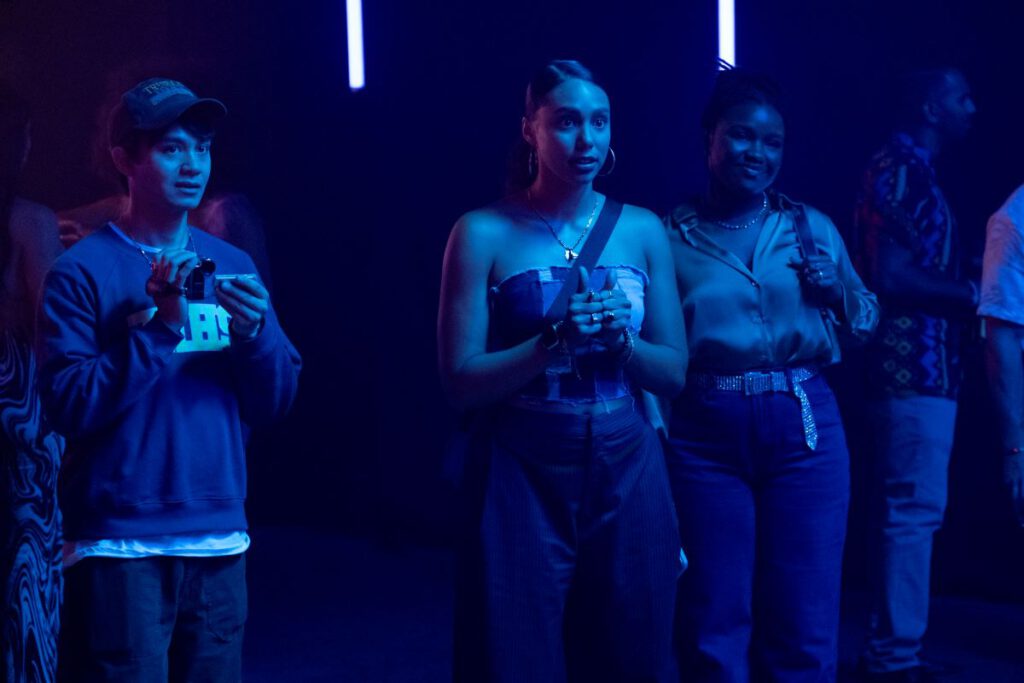There’s an old adage in communities of color: “You have to be twice as good to get half as far.” That saying certainly applies to media representation, where groups like Latinos rarely get to see ourselves. When we make it on screen, the expectations can be stifling, the smallest missteps reason to cancel the work and perhaps not greenlight the next seven. Because the stakes are so high and the opportunities are so rare, there’s no margin of error.
Enter Netflix’s “Neon,” a reggaeton series by Shea Serrano and Max Searle. It raised some red flags in Puerto Rican communities for having a Boricua protagonist and featuring an art form largely associated with the island but not having anyone who is actually Puerto Rican behind the scenes, despite boasting a diverse talent pool otherwise. Still, as one filmmaker told me, “Latinos, in general, are not interchangeable.” Since then, Netflix added famed Puerto Rican reggaetonero Daddy Yankee as an executive producer and guest star.
Now “Neon” is here, and it has a lot of expectations to live up to. Lovers of reggaeton will find plenty to enjoy. The sound thumps throughout the series, with homages to reggaeton royalty like Daddy Yankee, yes, but also to those casual fans who may not know like Jota Rosa.

Still, the show is decidedly uneven in tone, unsure of what it wants to be. Is it a bawdy, coming-of-age romp? At times. A music industry esposé? It reaches for that. A workplace comedy using music as its background? Sometimes. A more skilled show could balance these elements, but “Neon” falters.
A popular and compelling writer, Serrano’s other on-screen projects—“Primo” and “Miguel Wants to Fight”—share some of “Neon’s” elements. All three follow Latino young men trying to figure out who they are in multiracial environments. They have a common sensibility and humor. In the case of “Miguel Wants to Fight,” the similarities include the lead actor Tyler Dean Flores (here as Santi) and pilot director Oz Rodriguez.
But “Neon” lacks the heart of those earlier endeavors. “Primo” and “Miguel Wants to Fight” are powered by sweetness—a fundamental belief in the goodness of their leads and supporting casts. They center around good kids confronting conflicting ideas around masculinity and finding their way. But despite Flores’ best efforts, Santi is more amalgamation than a person. Santi has moments of sweetness, supporting his friends and gushing over his heroes, but he doesn’t have the kindness or awkwardness of Miguel or the titular Primo. He’s all swagger and ambition. And that ambition is ungrounded—we learn that reggaeton is supposed to be the only thing he’s good at, but we don’t see him loving making music or attempting other things.
Theoretically, Sant’s friendship with Ness (Emma Ferreira) and Felix (Jordan Mendoza) should give the show its structure. That’s how it was billed. But “Neon” makes it hard to root for its central trio or even understand their relationships by saving flashbacks to when they were growing up until the final episode. For the first seven installments, we’re supposed to take their intertwined past and close bond as a given.
As individuals, I liked each and even missed them when I finished screening the eight episodes. But I had no investment in their friendship for much of the season. Perhaps shorthand works for families like the ones we see in “Primo,” but friendships need a bit more setup to make sense emotionally, and “Neon” hides their backstory for too long.

The main trio also lacks emotional stakes, with none of them getting a meaningful or emotionally resonant arc until the end. Before that, their concerns are largely getting into the next party and polishing Santi’s ego. Instead, Mia (Courtney Taylor), as the band’s maybe record-label connection, makes real sacrifices and takes real risks. But she’s outside the core group, and so her journey just makes the central three seem more paltry. Everyone else is just playing, and it’s hard to care.
The comedy doesn’t help. While some elements, like a remixed grocery store jingle, are legitimately funny, a lot isn’t. For example, there’s an ongoing gag where Santi gets distracted because, as he puts it, some attractive young woman “wants to have sex with me.” The naming here is supposed to be funny with its bluntness and no-frill execution. But without exploring Santi’s actual escapades (how exactly does he get them in bed? What are the women’s motivations?), the whole thing is like a teenager fantasizing about casual sex and not the thing itself.
Santi does get a real love interest in Celeste (Alycia Pascual-Pena). But what makes her different from the others is impossible to know since we see so little of them, another way that particular choice undercuts the potential emotional resonance later on.
That’s a recurring pattern of “Neon,” which sets up a lot in its first season but doesn’t deliver on much of it. It’s not just the romance; a cartel plot gets an episode or two but then fizzles out without warning. Likewise, a trip to Art Basel allows the show to lampoon the fine art world but narratively feels like it’s just taking up space. The first two-thirds of the show is like this: introducing arcs and then dropping them without resolution.
It’s not until Santi hooks up with Isa (Genesis Rodriguez having a great time), a fictional, famous pop star, that any sort of plot establishes itself. But they meet in episode six. So even though Isa’s machinations power the finale (and set up for a second season if there is one), it’s too little too late.
“Neon” is a series of jokes, rhythms, and points with no guiding anchor. It’s a lot of things, but excellent is not one of them. And that’s a shame, especially as reggaeton continues its global dominance; we will need more shows and films depicting its particular culture and cadence. Here’s hoping that studio execs don’t take “Neon” as the end all, be all of the tales of the sound.
The whole season was screened for review. “Neon” is on Netflix now.












